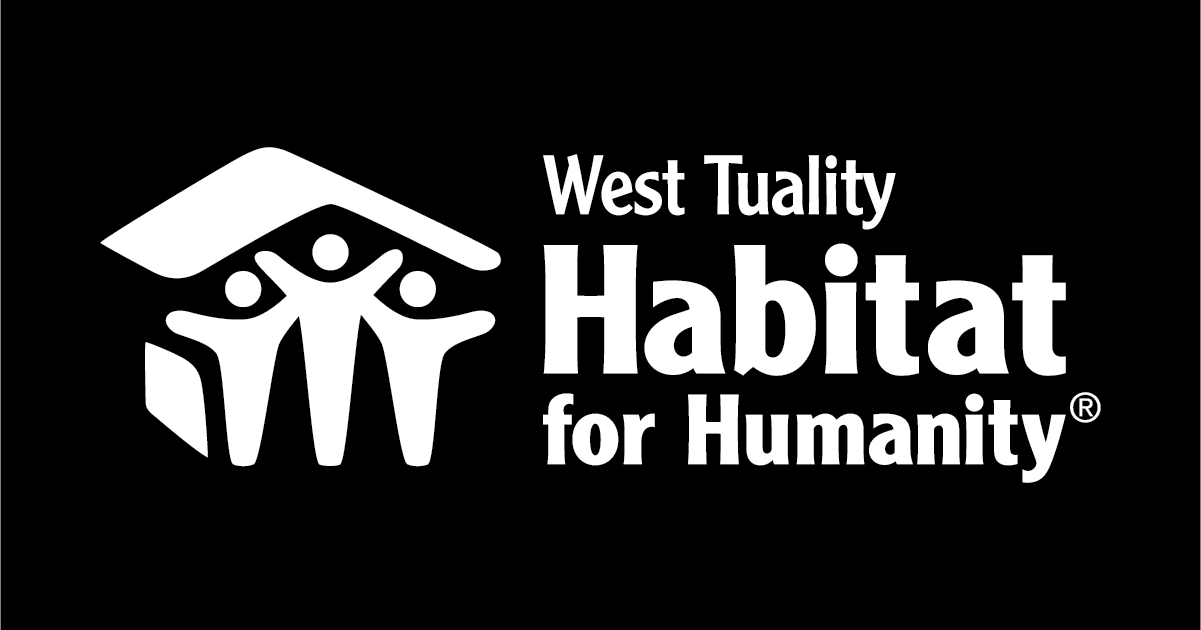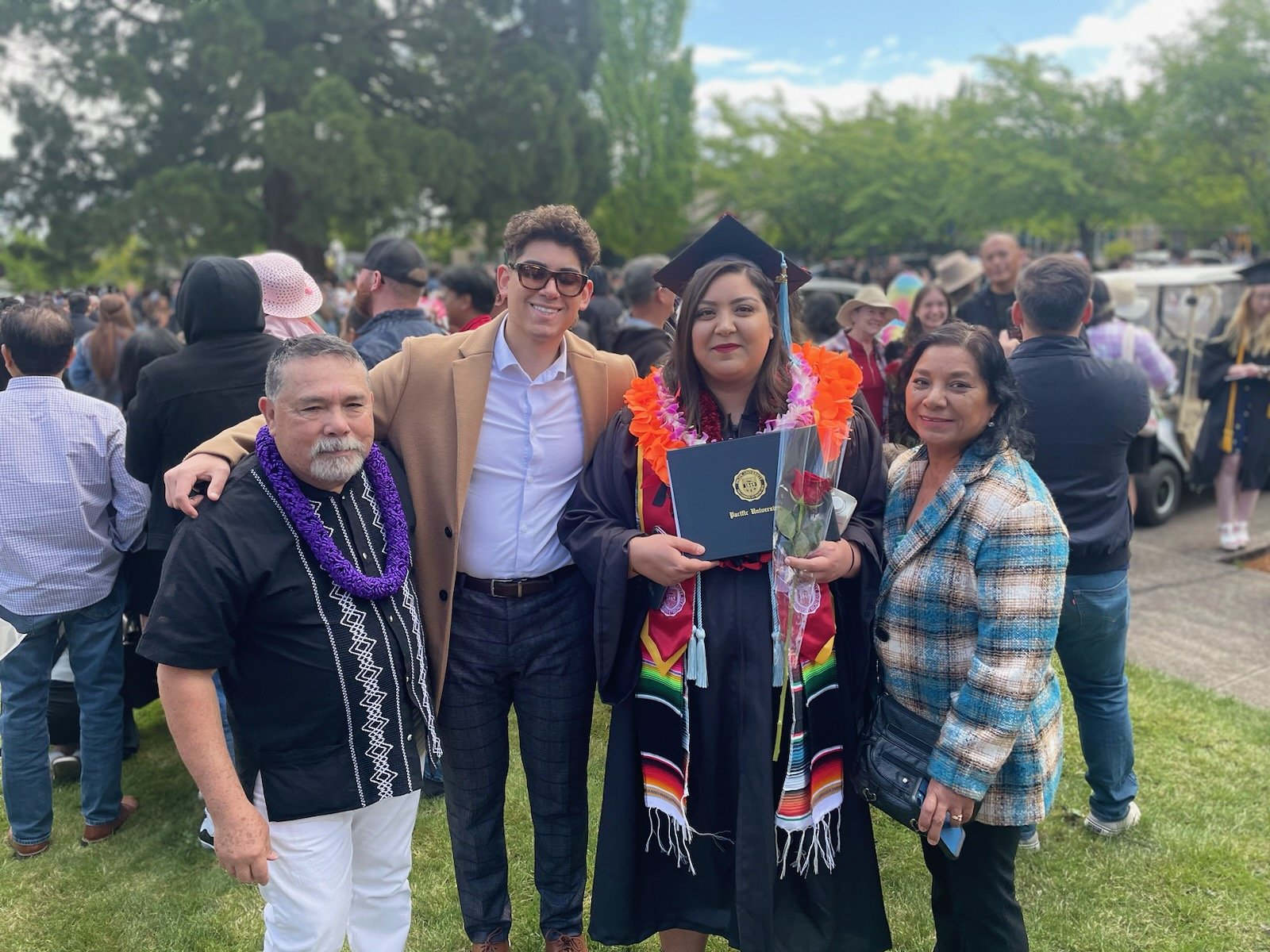Area Habitat family pays off their mortgage!
A local family that bought their first house through West Tuality Habitat for Humanity’s home ownership program in 2002 has paid off their mortgage and now owns their home in Cornelius outright. A celebration was held recently with the family, along with employees and volunteers from West Tuality Habitat and friends and neighbors to rededicate the house and honor the family’s achievement.
Donaciano and Dora Dominguez and their children, Sofia, then 9, and Chano, then 5, moved from a mobile home where they had been living into the Cornelius home built by Habitat volunteers and with their own contributions through sweat equity. The Dominguez home was the third built by volunteers and partners in the West Tuality chapter. The final mortgage payments were made by their now adult son, Chano, who is in the Pharmacy Residency Program at the University of California at Davis. Their daughter, Sophia, is now teaching at Cornelius Elementary School.
Donaciano and Dora are now retired.
In addition to a symbolic burning of the home’s mortgage, remarks were given by Cornelius Jeffrey C. Dalin, staff and board members from West Tuality Habitat, and members of the family.
The Dominguez family home was built by volunteers and members of other Habitat partner families in the program at the time. It was built in memory of Kaci Lea McMurry-Armstrong, 16, who died in a 1998 car crash near Hillsboro and was affiliated with a member of the West Tuality Habitat board, and there is a plaque to honor her at the home.
The family is seen at left in a photo from the Hillsboro Argus in January 2002 receiving a blanket from Bill Bash, who was part of the original group that founded our Habitat for Humanity affiliate.
As is noted on Habitat for Humanity International’s web site:
Stable housing — housing that is safe, healthy and affordable — is foundational to individuals and families, to the communities in which we live and to the economies in which we all participate. Increased family stability and economic mobility, a greater sense of dignity and civic pride, stronger and more vibrant communities that can attract and keep business and manufacturing — these are all connected to stable, decent, affordable housing… Homes that are affordable allow families to put a stake in their community, improving the space for everyone living there. Strong neighborhoods exist where residents have quality housing; are invested and engaged in their communities; have access to transportation, employment and educational opportunities and have a sense of safety and inclusion.
Habitat houses are modestly sized. They are large enough for the homeowner family’s needs, but small enough to keep construction and maintenance costs affordable. The labor of volunteers and partner families, efficient building methods, modest house sizes, and no-profit loans make it affordable for low-income families to purchase Habitat houses.
For over 30 years, West Tuality Habitat for Humanity in Forest Grove has worked with local families, volunteers, and partners in western Washington County to build homes with affordable mortgages and make critical repairs. Their work has proven critical to combatting the state’s affordable housing crisis by enabling more Oregonians to live in affordable and safe homes.
A Habitat home owners' mortgage, including mortgage payment, taxes, insurance and homeowners association fees, if applicable, will not exceed 30% of that family's gross monthly income at the time of sale. Habitat for Humanity often works to reach underserved communities specifically regarding affordable housing, and recognizes that a structure of intentional and systemic racial discrimination in the USA has created barriers to homeownership for many families. Individuals and families accepted into the Habitat home ownership program perform sweat equity as a part of this program, working at the construction sites or in the Forest Grove ReStore. Participants also complete financial literacy training and homebuyer counseling, which helps to ensure long-time success as new homeowners.
Habitat houses are built primarily by volunteers, alongside members of partner families who will be purchasing a home through Habitat as part of their “sweat equity” requirement (you can read more about sweat equity in English, o lee más sobre “sweat equity” en español). For West Tuality Habitat, there is a core group of volunteers with advanced construction skills who work at least three days a week on Habitat projects in Western Washington County. These core volunteers are regularly joined in the work by families that have qualified for home ownership through Habitat, as well as volunteers from the community, including employees volunteering through their work places, such as Intel, Lowe's, Wells Fargo, Heritage Bank, US Bank, Parr Lumber and more, as well as students from area colleges and universities. These additional volunteers often have no construction experience at all. Companies such as Lowe's and Malarkey Roofing in Portland provide building materials at discount prices and sometimes donate materials as well. Particularly specialized construction tasks requiring special contractors, including electrical, plumbing and roofing, are contracted out.
Homes built by Habitat meet all local building code requirements. Particularly specialized work like wiring, plumbing and roofing is contracted out.
Once finished, Countryman Estates will consist of eight homes supported by West Tuality Habitat: two single-story, fully-accessible units and six townhomes, each with three or four bedrooms and two full baths, as well as all appliances and fully-accessible ground floor living spaces and bedrooms. Participating families will help build their own and their neighbors’ homes, utilizing their sweat equity to help reduce the costs of their homes. Construction is expected to begin by the end of 2024.
Countryman estates is named in honor of Bruce Countryman, who has been the Habitat affiliate’s volunteer construction manager for six of his 13 years volunteering with the organization.
West Tuality Habitat also built Kidd Corner, a project with seven homes, adjacent to Countryman Estates. Kidd Corner is named in honor of former Forest Grove mayor and long-time Habitat supporter Richard Kidd. The local Habitat affiliate also completed a five-home development called Coopers Corner, at 19th Avenue and Oak Street near the Tuality Forest Grove Hospital. That subdivision was named for one of the chapter's founding members, the late Glenn Cooper.
West Tuality Habitat for Humanity is a local affiliate of Habitat for Humanity International and was formed in 1991. In addition to the affordable housing program, West Tuality Habitat also has a critical home repair program for low-income seniors, military veterans, and people with disabilities, allowing them to remain in their homes and age in place. West Tuality Habitat also operates a ReStore in Forest Grove, selling gently-used, donated furniture, appliances, home furnishings and leftover building supplies. These sales help fund its Habitat activities in the area.
For more information about donating financially, volunteering or applying to be a program participant, visit the West Tuality Habitat for Humanity web site at www.westtualityhabitat.org or call (503) 359-8459. There is also information available at the Forest Grove ReStore at 3731 Pacific Avenue.












